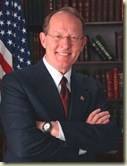 We’ve sometimes focus on silly politician quotes, but not really their context. When people hear something they think is stupid, they have every right to think it is stupid, but when they hear the same stupid thing repeatedly, or with mild variations, then the nub of the idiocy can get stuck in the head. There must be something to it or why does it keep getting said?
We’ve sometimes focus on silly politician quotes, but not really their context. When people hear something they think is stupid, they have every right to think it is stupid, but when they hear the same stupid thing repeatedly, or with mild variations, then the nub of the idiocy can get stuck in the head. There must be something to it or why does it keep getting said?
Thus, the constant conflating of industrially produced carbon dioxide with what we produce as individuals has become an effective bat to swing against cap-and-trade. Now, it may not work ultimately, because it’s Republicans swinging the bat and Democrats hitting the ball – er, so-to-speak – but it’s effective and can always be revived come the next election cycle. Think Drill baby drill and you’ve about got it.
We brought this up the other day, but we realize it can work in something like reverse. And in your own favor. Take, for example, this quote from Sen. Lamar Alexander:
U.S. Senator Lamar Alexander (R-Tenn.) today told Energy Secretary Steven Chu that “we should be as aggressive about expanding nuclear power . . . as we are with wind and solar” during a hearing of the Senate Appropriations Subcommittee on Energy and Water, of which Alexander is a member.
“In his inauguration address, the president talked about power from the earth, the wind, and the sun, which captured the imagination of a lot of people. But these sources provide less than 1.5 percent of our electricity today, and even if we reach 15 or 20 percent renewable power, we will still need 80 to 85 percent of base power,” Alexander told Secretary Chu. “We should be as aggressive about expanding nuclear power and doubling or tripling research funding to find a way to get rid of the carbon in existing coal plants as we are with wind and solar and other so-called renewable electricity sources because they do not provide base-load electricity.”
This all makes perfect sense to us – good luck on coal getting where it needs to be – but also a little curious. After all, Alexander is an appropriations guy – he really can put some muscle behind his verbiage. Even if the DOE wants less money for nuclear energy, Alexander and his peers can provide more and make strong suggestions how to use it. They can even codify it, as in the current climate change bill.
All true, but not really the point. The point is that this is also becoming a statement that is said again and again, with the aim of impressing itself upon anyone listening. If Alexander could bring about 20 or 50 or more nuclear plants, he no doubt could find a way to do that. But in the face of opposition, he does this instead (and we should note, Chu was receptive – we like Chu’s habit of saying what he believes even if the politics are not quite where they should be.) That’s why it appears on his Web site for all and sundry to pick up.
---
And to be fair, some do think even this is stupid. Here’s Tennessee blogger Pete Kotz letting Alexander have it:
He's calling for the construction of 100 nuclear power plants, arguing that it's more practical than investing in renewable energy. He cites France, where 80 percent of its energy comes from nukes, and it has some of the cheapest and cleanest electricity in Europe.
Unfortunately, there are a few problems with the good senator's thinking…
You can read the rest to see why Kotz doesn’t like this idea (though his first point, “it's never good to take your cues from France,” is pretty juvenile) but it suggests that Alexander is doing what every media-savvy politician tries to do: gain traction for his ideas.
---
We have to say, we’ve become big admirers of Sen. Alexander. Most of what he says about energy is on-point and reasonably balanced. That’s not as usual as it should be.
Senator Lamar Alexander
Comments
In many cases, what you have is a 1-2 hour public show where the senators and representatives get to make speeches in the form of questions and establish firm positions that can be useful in the committee negotiations as mark ups progress. I guarantee you that the senator's remarks will be captured and quoted by staffers several times during the budget decision process.
It is reassuring to recognize just how far we are now from the time when expressing strong support for nuclear power expansion was a political third rail.